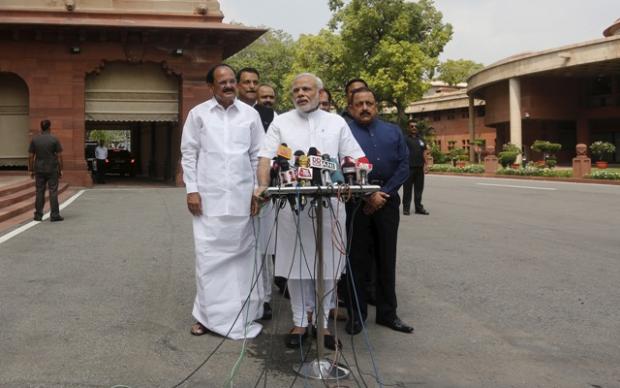
Prime Minister Narendra Modi is facing a formidable bureaucracy
Today happens to be Ganesh Chaturthi. It also happens to be the birthday of Prime Minister Narendra Modi. If you believe gossip, many bureaucrats today are praying to Lord Ganesh and seeking a single term for the Prime Minister. Last evening, the NDA regime dropped a bombshell on bureaucrats. It has decided that bureaucrats who are either incompetent or tainted, or both, will face compulsory retirement after they celebrate their 50th birthday. Like in many senior positions in the private sector, they will get three months to pack their bags.
If this decision is actually implemented, it would be a monumental achievement. Indian bureaucrats might think that they constitute the steel frame that holds the country together. But the average citizen loathes and detests Indian bureaucrats. For the aam aadmi, the bureaucrat is inaccessible, arrogant, unaccountable and often corrupt to the core. This is not a sweeping generalization or judgement. Many individual bureaucrats are indeed inspirational role models. But as a group, they have behaved like parasites who have done everything possible to prevent the innate entrepreneurial energies of India from blossoming. Sure, politicians too have done that. But many of them get kicked out by voters every five years or so. Not so with Indian bureaucrats.
Let me give you two examples of the mischief (I don't know if deliberate or not) that bureaucracy is capable of; and how that can inflict irreparable damage. Finance Minister Arun Jaitley keeps repeating ad nauseum that his government is committed to simplifying tax rules and procedures for individuals as well as companies. Last year, when he was out of India, the "babus" released a new income tax form that horrified even diehard supporters of Modi. This marvel of a form required tax payers to detail all expenses incurred in foreign trips apart from many other infuriating requirements. Jaitley was forced to "order" his babus to withdraw that "order". But his reputation as a reformer was virtually shattered. The second example relates to the sensitive and controversial issue of One Rank, One Pension (OROP). The Prime Minister had made a solemn commitment to implement it during his election campaign. But thanks to bureaucrats, the decision kept getting delayed. Matters reached a stage where armed forces veterans started losing faith and trust in Modi. Even when the decision was announced formally by the Defense Minister Manohar Parrikar, the babus managed to create confusion and rift. The official statement had the words "voluntary retirement". Instead of celebrating the implementation of OROP, veterans were wondering what this meant. It took a public clarification from Modi to clear the air. But the damage had been done by then.
It is not as if no efforts have been made to reform Indian bureaucracy and governance. An Administrative Reforms Commission was first set up in 1966 to suggest reforms. It submitted about 20 reports before being wound up in the 1970s. No recommendation made about bureaucrats being made accountable and more responsive to citizens was implemented. The second such Commission was formed in 2005 and has submitted about 15 reports. Any implementation of accountability? Sorry. Three successive Pay Commissions since the 1980s have strongly recommended basic steps like performance based increments and promotions for bureaucrats. Nothing doing.
The problem is that the bureaucracy, like an army of termites, has so deeply infiltrated every institution and organization of governance that they have become de facto lords and masters. The telecom regulator is usually a retired IAS officer. The Chief Information Commissioner is usually a retired IAS officer; someone who has perhaps spent his entire career thwarting transparency! The Competition Commission of India is headed by an IAS officer. The Election Commission is inhabited by retired IAS officers. The administrative tribunals are headed by retired IAS officers. The aviation regulator is invariably a retired IAS officer. The UPSC chairman is usually a retired IAS…. The list is endless. People in the know joke that it is a divine blessing that the Delhi Metro was headed by a technocrat like E. Sreedharan. If an IAS had headed it, the damn thing might still be under construction!
Very soon, the recommendations of the Seventh Pay Commission (inhabited mostly by retired bureaucrats) will be submitted. There will be strong recommendations about variable pay, transparent performance appraisals and increments and promotions linked to performance. Perhaps Modi might gather the political will to finally bite the bullet and implement reforms in bureaucracy. The decision to compulsorily retire some after the age of 50 looks like a promising first step. But make no mistake: the Empire will strike back; and viciously. More than political opponents, it is this entrenched mafia that will make every attempt to derail his governance agenda.
(SOURCE- BUSINESS WORLD)
No comments:
Post a Comment